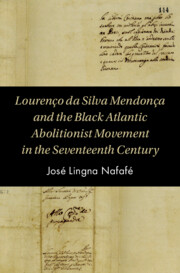Book contents
- Lourenço da Silva Mendonça and the Black Atlantic Abolitionist Movement in the Seventeenth Century
- Cambridge Studies on the African Diaspora
- Lourenço da Silva Mendonça and the Black Atlantic Abolitionist Movement in the Seventeenth Century
- Copyright page
- Contents
- Figures
- Tables
- Acknowledgements
- Introduction
- 1 The Municipal Council of Luanda and the Politics of the Portuguese Governors in Angola
- 2 Ndongo’s Political and Cultural Environment: Alliance, Internal Struggle, Puppeteering and Decline
- 3 The Journey of Mendonça: The Princes of Pungo-Andongo in Brazil
- 4 Mendonça’s Journey to Portugal and Spain, and the Network of the Hebrew Nation and Indigenous Americans
- 5 Mendonça’s Discourse in the Vatican: Liberation as a Wider Atlantic Question
- 6 Mendonça’s Quest for Abolition and the Tussle between the Portuguese Overseas Council and the House of Ndongo
- Conclusion
- Bibliography
- Index
2 - Ndongo’s Political and Cultural Environment: Alliance, Internal Struggle, Puppeteering and Decline
Published online by Cambridge University Press: 18 August 2022
- Lourenço da Silva Mendonça and the Black Atlantic Abolitionist Movement in the Seventeenth Century
- Cambridge Studies on the African Diaspora
- Lourenço da Silva Mendonça and the Black Atlantic Abolitionist Movement in the Seventeenth Century
- Copyright page
- Contents
- Figures
- Tables
- Acknowledgements
- Introduction
- 1 The Municipal Council of Luanda and the Politics of the Portuguese Governors in Angola
- 2 Ndongo’s Political and Cultural Environment: Alliance, Internal Struggle, Puppeteering and Decline
- 3 The Journey of Mendonça: The Princes of Pungo-Andongo in Brazil
- 4 Mendonça’s Journey to Portugal and Spain, and the Network of the Hebrew Nation and Indigenous Americans
- 5 Mendonça’s Discourse in the Vatican: Liberation as a Wider Atlantic Question
- 6 Mendonça’s Quest for Abolition and the Tussle between the Portuguese Overseas Council and the House of Ndongo
- Conclusion
- Bibliography
- Index
Summary
Chapter 2 introduces the kingdom of Ndongo and focuses on its relationship to Kongo in terms of political and social structures. It looks at the election of Philipe Hari I to the throne of Pungo-Andongo, examining his rivalry with and family ties to Queen Njinga, and how the Portuguese used his election to foster trade relationships in Angola by introducing the baculamento tax system. The chapter then explores the role of João Hari II (Dom João de Sousa), also known as Ngola Aiidi, the son who succeeded Hari I, and the ideology of Francisco de Távora ‘Cajanda’, the Portuguese governor of Luanda at the time. It investigates the destruction of Pungo-Andongo and the sending of the kingdom’s princes and princesses, Queen Njinga’s nephews and nieces, to Brazil. The chapter is concerned with exploring the political environment of Angola and the wider region as the backdrop to Mendonça’s debate on freedom and enslaved Africans in the Atlantic region.
Keywords
- Type
- Chapter
- Information
- Lourenço da Silva Mendonça and the Black Atlantic Abolitionist Movement in the Seventeenth Century , pp. 138 - 192Publisher: Cambridge University PressPrint publication year: 2022

